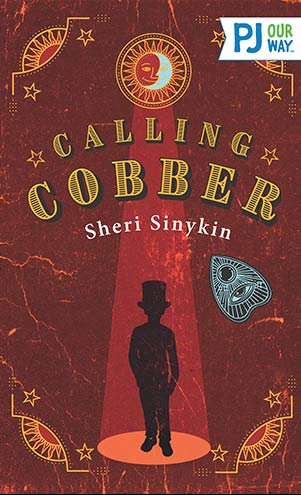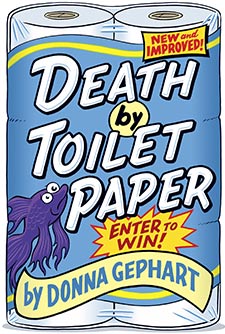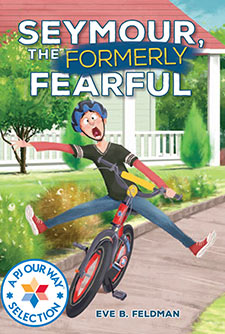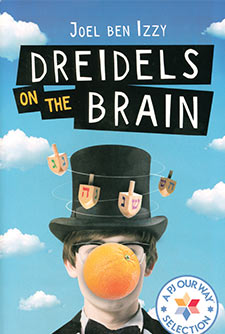Calling Cobber
A bar mitzvah and the school talent show are the last things Cobber wants to do – his last public performance ended in complete disaster! But Cobber’s best friend, Boolkie, and his great-grandfather, Papa-Ben, aren’t letting him off the hook so easily…
Average Rating
( hint: Login to leave a review! )
33 Reviews
Leave Review
What the Book is About
Jewish Content & Values
Positive Role Models
Content Advisory
Talk it Over!
More for You
Cobber’s mom died when he was little, and his dad works all the time. This means that Cobber (real name Jacob) spends a lot of time with his great-grandfather, Papa-Ben, who lives independently in a senior living complex – though he’s becoming more and more forgetful. When Papa-Ben tries to persuade Cobber to have a bar mitzvah, and Cobber’s best friend Boolkie wants him to participate in the school talent show, Cobber is less than thrilled, remembering that he threw up in front of everyone the last time he spoke publicly. Over the course of the book, Cobber starts to discover what being Jewish means to him, and he learns to face and overcome his fears. Meanwhile, Papa-Ben helps Cobber’s dad realize that he needs to be more emotionally present as a parent and inspires him to reintroduce Jewish traditions into their home.
- Papa-Ben’s first language was Yiddish, and there are Yiddish words sprinkled throughout the book. Papa-Ben wants Cobber to appreciate his Jewish heritage and to have a bar mitzvah. The two have a conversation about what it means to be Jewish.
- Cobber struggles with belief in God, and he and the rabbi talk about why God lets people we love die. The rabbi tells Cobber that his twice per week visits to Papa-Ben are a mitzvah.
- Cobber makes a Shabbat meal, complete with chicken soup and challah. His father makes kiddush (the blessing over wine), and Papa-Ben says hamotzi (the blessing before eating bread).
- In temple for the Yom Kippur service, Cobber sees the yahrzeit (memorial) lamp inscribed with his mother’s name.
- Boolkie’s brother Eli has his bar mitzvah, and there is a scene in the book where this takes place, including parading the Torah around the congregation (hakafah), undressing the Torah, a transliterated Barechu (call to prayer), part of Eli’s d’var Torah (talk on the week’s Torah portion), and part of a transliterated kaddish (the mourner’s prayer for the dead).
- When Papa-Ben falters while reciting a brachah (prayer) on the bimah (platform from where the Torah is read), Cobber finds that he knows the words and can complete the prayer for him.
- Papa-Ben talks to Cobber about their Jewish heritage and conveys the strength of his own Jewish identity. Papa-Ben always believes in Cobber, even when Cobber lacks self-confidence.
- As Cobber’s best friend, Boolkie won’t give up on Cobber even when he is wallowing in self-pity and resentful of Boolkie’s happy home life. Boolkie persuades Cobber to do his magic act in the talent show and encourages him to succeed.
- Cobber is a devoted great-grandson. When it becomes clear that Papa-Ben can no longer live independently, and Cobber’s father wants to put him into a home, Cobber convinces his dad that Papa-Ben should move in with them.
Papa-Ben has a few unsettling moments, such as when he forgets to turn off the stove and burns a pan, or when he accidentally takes too many pills and has to go to the hospital. Cobber still misses his mom, who died suddenly of an aneurysm when he was 6 (long before the events of the book). On a couple of occasions, he uses a Ouija board to try and contact her.
Papa-Ben convinces Cobber – more than once – not to tell his father about Papa-Ben’s failing memory in order to avoid being put in a home. Do you think Papa-Ben was right to ask Cobber to keep that secret? What would you have done in Cobber’s position?
When Papa-Ben moves into Cobber’s house, he places one hand over Cobber’s head and the other hand over Cobber’s father’s head, saying, “May the Creator of the sun and the moon and the stars shine upon you, and be gracious unto you. May the Lord bless you and keep you. May He lift up His countenance upon you and give you peace.” This blessing, the Priestly Benediction, (Birkat Kohanim) is from the Book of Numbers 6: 24-26 and is the earliest biblical passage to be found in an ancient artifact. In 1979, two tiny silver scrolls inscribed with the words of the prayer were found in a tomb near Jerusalem. They date back to just before the destruction of Jerusalem in 586 B.C., which makes them 400 years older than the Dead Sea Scrolls.
What the Book is About
Cobber’s mom died when he was little, and his dad works all the time. This means that Cobber (real name Jacob) spends a lot of time with his great-grandfather, Papa-Ben, who lives independently in a senior living complex – though he’s becoming more and more forgetful. When Papa-Ben tries to persuade Cobber to have a bar mitzvah, and Cobber’s best friend Boolkie wants him to participate in the school talent show, Cobber is less than thrilled, remembering that he threw up in front of everyone the last time he spoke publicly. Over the course of the book, Cobber starts to discover what being Jewish means to him, and he learns to face and overcome his fears. Meanwhile, Papa-Ben helps Cobber’s dad realize that he needs to be more emotionally present as a parent and inspires him to reintroduce Jewish traditions into their home.
Jewish Content & Values
- Papa-Ben’s first language was Yiddish, and there are Yiddish words sprinkled throughout the book. Papa-Ben wants Cobber to appreciate his Jewish heritage and to have a bar mitzvah. The two have a conversation about what it means to be Jewish.
- Cobber struggles with belief in God, and he and the rabbi talk about why God lets people we love die. The rabbi tells Cobber that his twice per week visits to Papa-Ben are a mitzvah.
- Cobber makes a Shabbat meal, complete with chicken soup and challah. His father makes kiddush (the blessing over wine), and Papa-Ben says hamotzi (the blessing before eating bread).
- In temple for the Yom Kippur service, Cobber sees the yahrzeit (memorial) lamp inscribed with his mother’s name.
- Boolkie’s brother Eli has his bar mitzvah, and there is a scene in the book where this takes place, including parading the Torah around the congregation (hakafah), undressing the Torah, a transliterated Barechu (call to prayer), part of Eli’s d’var Torah (talk on the week’s Torah portion), and part of a transliterated kaddish (the mourner’s prayer for the dead).
- When Papa-Ben falters while reciting a brachah (prayer) on the bimah (platform from where the Torah is read), Cobber finds that he knows the words and can complete the prayer for him.
Positive Role Models
- Papa-Ben talks to Cobber about their Jewish heritage and conveys the strength of his own Jewish identity. Papa-Ben always believes in Cobber, even when Cobber lacks self-confidence.
- As Cobber’s best friend, Boolkie won’t give up on Cobber even when he is wallowing in self-pity and resentful of Boolkie’s happy home life. Boolkie persuades Cobber to do his magic act in the talent show and encourages him to succeed.
- Cobber is a devoted great-grandson. When it becomes clear that Papa-Ben can no longer live independently, and Cobber’s father wants to put him into a home, Cobber convinces his dad that Papa-Ben should move in with them.
Content Advisory
Papa-Ben has a few unsettling moments, such as when he forgets to turn off the stove and burns a pan, or when he accidentally takes too many pills and has to go to the hospital. Cobber still misses his mom, who died suddenly of an aneurysm when he was 6 (long before the events of the book). On a couple of occasions, he uses a Ouija board to try and contact her.
Talk it Over!
Papa-Ben convinces Cobber – more than once – not to tell his father about Papa-Ben’s failing memory in order to avoid being put in a home. Do you think Papa-Ben was right to ask Cobber to keep that secret? What would you have done in Cobber’s position?
More for You
When Papa-Ben moves into Cobber’s house, he places one hand over Cobber’s head and the other hand over Cobber’s father’s head, saying, “May the Creator of the sun and the moon and the stars shine upon you, and be gracious unto you. May the Lord bless you and keep you. May He lift up His countenance upon you and give you peace.” This blessing, the Priestly Benediction, (Birkat Kohanim) is from the Book of Numbers 6: 24-26 and is the earliest biblical passage to be found in an ancient artifact. In 1979, two tiny silver scrolls inscribed with the words of the prayer were found in a tomb near Jerusalem. They date back to just before the destruction of Jerusalem in 586 B.C., which makes them 400 years older than the Dead Sea Scrolls.




